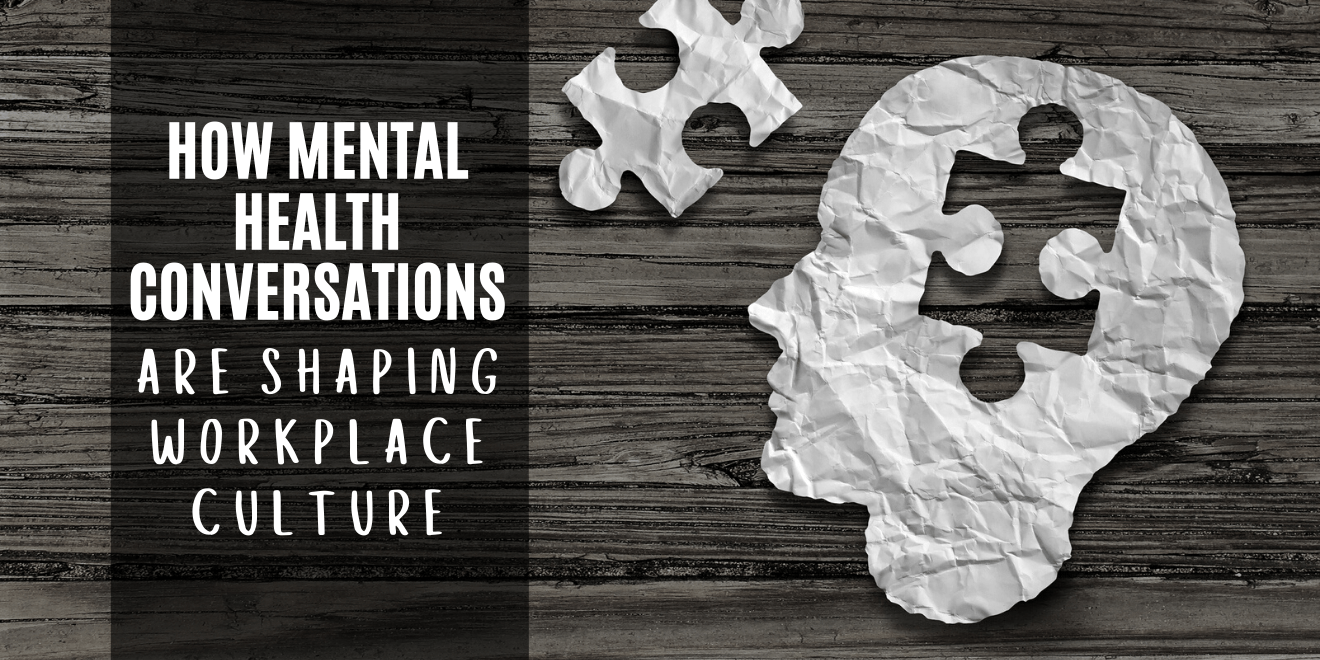How Mental Health Conversations are Shaping the Workplace Culture

Mental health has been a sort of ‘elephant in the room’ for quite some time.
For decades, it has been taboo to openly discuss mental health problems. This has led to a lot of problems for professionals and everyday people.
Fortunately, this is starting to change. As more people are recognizing the importance of dealing with their mental health problems, more people are beginning to open up about these issues. Discussions about mental health, especially when had in the workplace environment, can lead to long-term changes in the way that people perceive and address mental health.

In this article, we’re going to talk about the importance of mental health conversations and explain how these conversations can help to shape the workplace culture.
There’s little doubt that mental health problems are on the rise, especially in work environments. In fact, a recent study that was done by Mind Share partners evaluated 1,500 professionally employed adults. It was revealed that 75% of Generation Z employees and half of all millennials have left a job for some sort of mental health reason.
This is a stark increase from older generations. Only 20% of older people reported leaving a job for mental health reasons.
This could indicate several things:

It’s readily apparent that the majority of adults spend a great deal of their time at work. Most adults spend about 8 hours a day working - which equates to about a third of their total lives, and half of their waking life.
Since adults spend such a great deal of their time at work, it’s easy to understand that their workplace culture and environment can have a huge influence on their behavior. People develop habits and beliefs at work that can affect their mental health. These influences can be either positive or negative, depending on the culture of their workplace.
Workplaces with unhealthy culture can actually lead to the deterioration of their employees’ mental health. Conversely, workplace environments that cater to the mental health and general wellbeing of their employees may encourage them to develop healthy long-term habits that can improve their mental health.
Signs of a healthy workplace culture include:
According to the same study mentioned earlier, 86% of all people surveyed believe that it’s important for a company to support the mental health of its workers. Unfortunately, less than half of these people reported that their workplaces made mental health a priority.

Even fewer people thought that their superiors were attempting to increase awareness about mental health.
Despite the fact that depression and anxiety are expensive issues, costing more than $1 trillion annually across the globe, the majority of people feel uncomfortable discussing their mental health in their workplaces.
In a country where more than 200 million workdays are missed every year because of depression alone, the majority of Americans surveyed report that they haven’t mentioned their mental health to their employers in the last year.
What we consider a healthy workplace today is not necessarily the same thing that would have been considered a healthy workplace a century ago. Employers are becoming increasingly aware of the importance of managing employee mental health, and employees are becoming increasingly aware of the importance of finding employees who will respect their well-being.
These changes didn’t just come from nowhere. Changes in workplace culture occur alongside changing needs, and these needs are often brought into the limelight because of conversations. If nobody ever spoke out about the importance of mental health, then many employers would still consider it to be a negligible issue.
There are a couple of things that employers can do to help encourage conversations of this nature. These conversations can then be used to help shape the culture of the workplace environment.
Remember, it’s not just employers who are responsible for encouraging mental health conversations in the workplace. Employees can help bring awareness to these issues simply by being open and upfront about them.
The most effective approach, however, would be one in which both employees and employers engage in frequent discussions about mental health.
Both employers and employees have a shared responsibility to bring awareness to mental health problems. Increasing awareness will benefit not just the employees but the employers as well.
One of the most important things for employers to remember is that bringing awareness to mental health is generally not an expensive endeavor. All that it requires is dedication, consistency, and a desire to improve the mental health of your employees.

There are a number of problems facing the workplace culture of modern times. One of the most pressing issues is the neglect of mental health.
Fortunately, the workplace culture can improve. Both employers and employees are engaging in conversations that promote awareness of mental health, and this is having a positive influence on the culture of workplaces across the globe.
For decades, it has been taboo to openly discuss mental health problems. This has led to a lot of problems for professionals and everyday people.
Fortunately, this is starting to change. As more people are recognizing the importance of dealing with their mental health problems, more people are beginning to open up about these issues. Discussions about mental health, especially when had in the workplace environment, can lead to long-term changes in the way that people perceive and address mental health.

In this article, we’re going to talk about the importance of mental health conversations and explain how these conversations can help to shape the workplace culture.
Why It’s Important to Talk About Mental Health at Work
There’s little doubt that mental health problems are on the rise, especially in work environments. In fact, a recent study that was done by Mind Share partners evaluated 1,500 professionally employed adults. It was revealed that 75% of Generation Z employees and half of all millennials have left a job for some sort of mental health reason.
This is a stark increase from older generations. Only 20% of older people reported leaving a job for mental health reasons.
This could indicate several things:
- Mental health problems are increasing in frequency among the younger generations.
- Younger generations are more aware of their mental health and are more willing to take actionable steps to improve their mental health than older generations.

The Importance of Workplace Culture
It’s readily apparent that the majority of adults spend a great deal of their time at work. Most adults spend about 8 hours a day working - which equates to about a third of their total lives, and half of their waking life.
Since adults spend such a great deal of their time at work, it’s easy to understand that their workplace culture and environment can have a huge influence on their behavior. People develop habits and beliefs at work that can affect their mental health. These influences can be either positive or negative, depending on the culture of their workplace.
Workplaces with unhealthy culture can actually lead to the deterioration of their employees’ mental health. Conversely, workplace environments that cater to the mental health and general wellbeing of their employees may encourage them to develop healthy long-term habits that can improve their mental health.
Signs of a healthy workplace culture include:
- The opportunity for employees to feel heard and understood regarding any of their concerns, especially those regarding mental health.
- A non-judgmental atmosphere in which employees feel comfortable enough to express their feelings and issues.
- Frequent dialogue between employers and employees concerning the health and well-being of workers.
Current Issues With Workplace Culture
According to the same study mentioned earlier, 86% of all people surveyed believe that it’s important for a company to support the mental health of its workers. Unfortunately, less than half of these people reported that their workplaces made mental health a priority.

Even fewer people thought that their superiors were attempting to increase awareness about mental health.
Despite the fact that depression and anxiety are expensive issues, costing more than $1 trillion annually across the globe, the majority of people feel uncomfortable discussing their mental health in their workplaces.
In a country where more than 200 million workdays are missed every year because of depression alone, the majority of Americans surveyed report that they haven’t mentioned their mental health to their employers in the last year.
How Conversations Can Change the Culture
What we consider a healthy workplace today is not necessarily the same thing that would have been considered a healthy workplace a century ago. Employers are becoming increasingly aware of the importance of managing employee mental health, and employees are becoming increasingly aware of the importance of finding employees who will respect their well-being.
These changes didn’t just come from nowhere. Changes in workplace culture occur alongside changing needs, and these needs are often brought into the limelight because of conversations. If nobody ever spoke out about the importance of mental health, then many employers would still consider it to be a negligible issue.
There are a couple of things that employers can do to help encourage conversations of this nature. These conversations can then be used to help shape the culture of the workplace environment.
- Managers and business owners can create peer support networks among their colleagues and employers. These support networks can be useful opportunities for people to share concerns about mental health. These concerns can then be addressed in a way that allows the company to improve.
- Managers and business owners can encourage dialogue between themselves and employees. Frequent check-ins with employees can help reduce the chances of them developing mental health problems.
- Employers can make an active effort to replace some of the negative stigma associated with mental health with a positive affirmation. This will encourage employees to open up about their issues and will reduce judgment in the workplace.
- One of the best things that an employer can do is simply talk about the importance of mental health. Many employees are hesitant to speak up about their mental issues simply because nobody else has. An employer can easily bridge this gap by bringing awareness to mental health.
Encouraging Conversations In the Workplace
Remember, it’s not just employers who are responsible for encouraging mental health conversations in the workplace. Employees can help bring awareness to these issues simply by being open and upfront about them.
The most effective approach, however, would be one in which both employees and employers engage in frequent discussions about mental health.
- Leaders in companies can help encourage these conversations by actively engaging their employees in a way that generates positive feedback.
- Employees can spur these conversations by discussing their mental health with co-workers and managers.
Both employers and employees have a shared responsibility to bring awareness to mental health problems. Increasing awareness will benefit not just the employees but the employers as well.
One of the most important things for employers to remember is that bringing awareness to mental health is generally not an expensive endeavor. All that it requires is dedication, consistency, and a desire to improve the mental health of your employees.

Conclusion
There are a number of problems facing the workplace culture of modern times. One of the most pressing issues is the neglect of mental health.
Fortunately, the workplace culture can improve. Both employers and employees are engaging in conversations that promote awareness of mental health, and this is having a positive influence on the culture of workplaces across the globe.




































































































